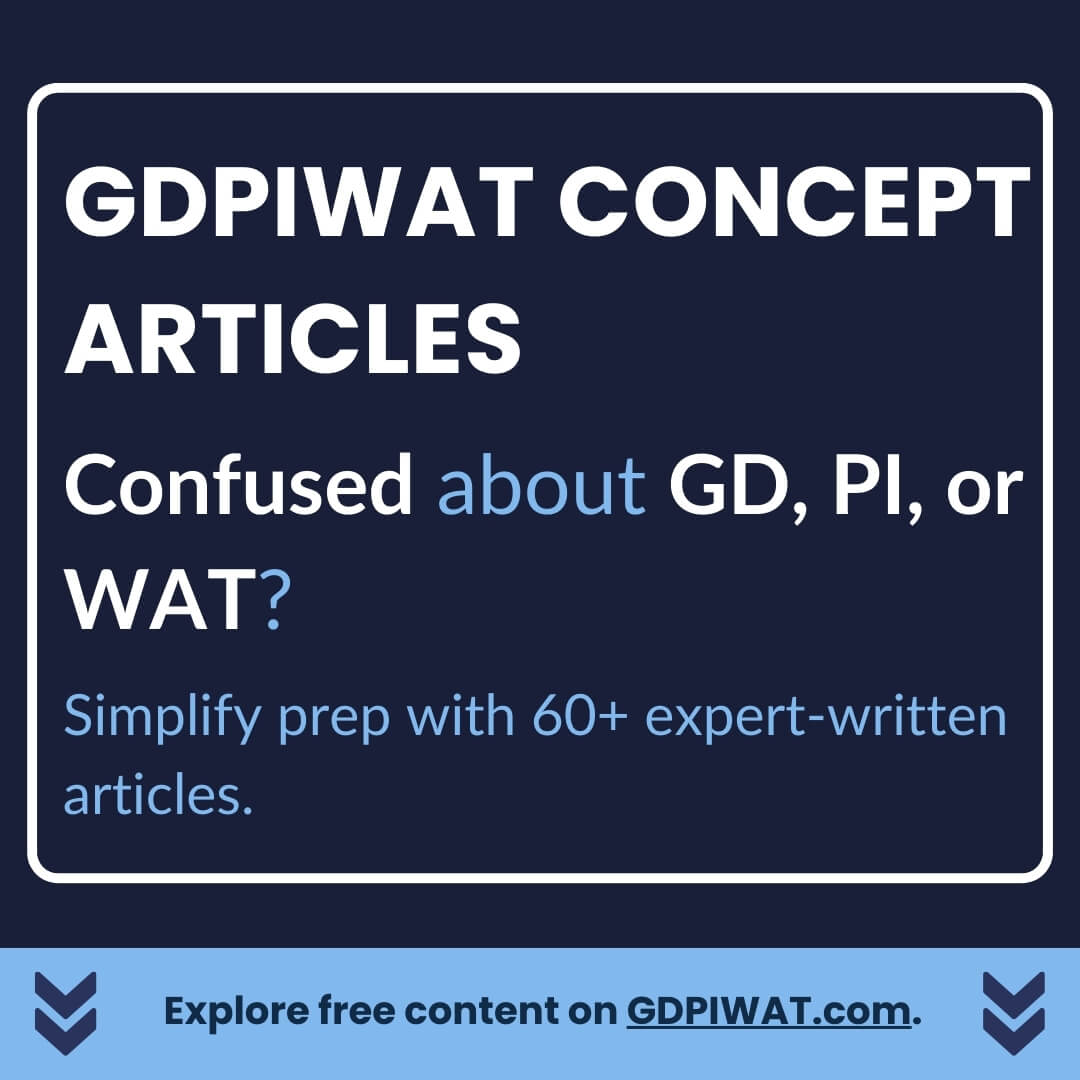Daily Vocabulary Words: Enhance Your Lexicon with Leading Newspapers & Publications
Welcome to the Daily Vocabulary section at Wordpandit!
Our mission is straightforward: to bring you essential vocabulary words featured in top newspapers and publications worldwide. By focusing on words you’ll encounter in renowned sources, we aim to help you enhance your vocabulary effectively and practically.
Our selection includes words from:
– The New York Times
– The Washington Post
– Scientific American
– BBC
– The Guardian
– Psychology Today
– Wall Street Journal
– The Economist
– The Hindu
– The Times of India
– The Economic Times
– Hindustan Times
– Live Mint
– The Indian Express
– And many more.
We are committed to your vocabulary development. Simply visit this section regularly and explore the daily posts. This is your go-to repository for commonly used words, providing significant practical benefits by familiarizing you with vocabulary from the leading publications listed above.
Make it a habit to visit our website daily and expand your lexicon with words from top newspapers and publications. (edited)
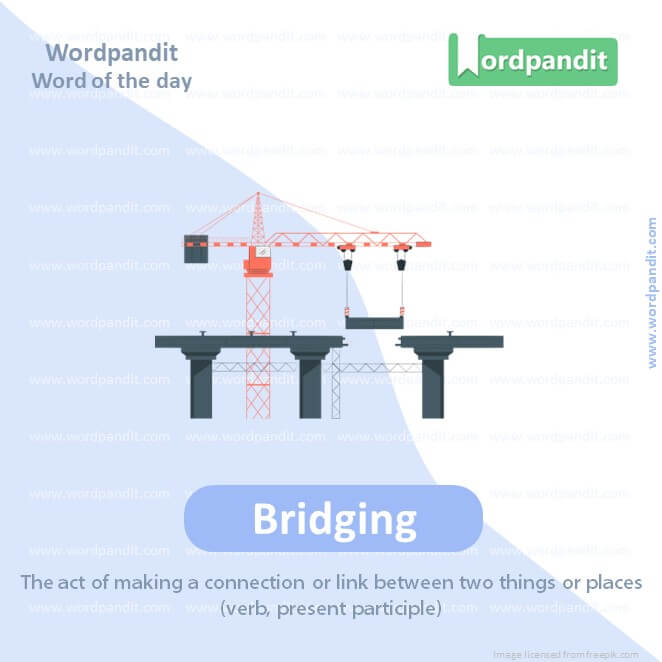
WORD 1: BRIDGING
CONTEXT: It also shows a deep convergence of views between France and India: our two countries champion the idea that socioeconomic development and environment protection can go hand in hand, are committed to bridging North-South divides, and believe that we can together find sustainable solutions for the world and for our own green transitions.
SOURCE: The Hindu
EXPLANATORY PARAGRAPH: Imagine two separate pieces of your toy train track that aren’t connected, so the train can’t go from one piece to the other. If you put a small piece between them so the train can cross, you’re “bridging” the gap. It means connecting two things so they can work together or interact.
MEANING: The act of making a connection or link between two things or places
(verb, present participle)
PRONUNCIATION: BRIJ-ing
SYNONYMS: Connecting, linking, spanning, joining, coupling
USAGE EXAMPLES:
1. The new bridge is bridging the two communities.
2. They discussed strategies for bridging the communication gap.
3. Bridging cultural differences is essential in international business.
4. She focused on bridging the gap between theory and practice.
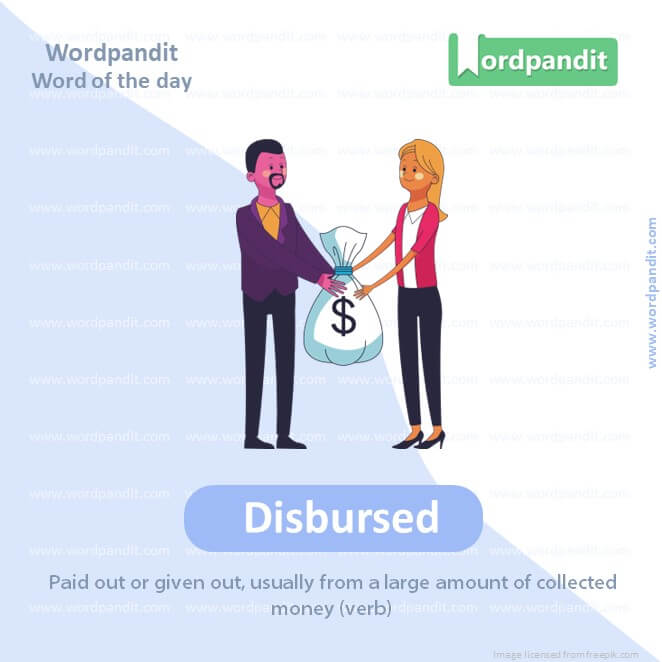
WORD 2: DISBURSED
CONTEXT: A green credit line with the State Bank of India was disbursed for electric buses and energy-efficient housing.
SOURCE: The Hindu
EXPLANATORY PARAGRAPH: Imagine you have a piggy bank full of coins. When you open it and give some coins to your friends, you are “disbursing” the money. It means paying out or distributing money that has been set aside for a specific purpose.
MEANING: Paid out or given out, usually from a large amount of collected
money (verb)
PRONUNCIATION: dis-BURST
SYNONYMS: Paid out, distributed, allocated, expended, spent
USAGE EXAMPLES:
1. Funds were disbursed to the victims of the disaster.
2. The scholarships will be disbursed at the beginning of the school year.
3. They ensured the grants were disbursed efficiently.
4. The money was disbursed among several departments.
WORD 3: VIVIDLY
CONTEXT: The growth of right-wing nationalism, the global problem of refugees and migrants throws light on the fissures that vividly exist in societies and in ideologies.
SOURCE: The Hindu
EXPLANATORY PARAGRAPH: Imagine remembering your birthday party with all the colors, sounds, and fun as if it was happening right now. That’s what “vividly” means. It’s remembering or describing something in a very clear, detailed way that makes it easy to imagine.
MEANING: In a way that produces powerful feelings or strong, clear images in the mind (adverb).
PRONUNCIATION: VIV-id-lee
SYNONYMS: Clearly, sharply, distinctly, brightly, colorfully
USAGE EXAMPLES:
1. She vividly described her trip to Paris.
2. The event remains vividly in my memory.
3. He could recall the conversation vividly.
4. The book vividly portrays the life of the artist.
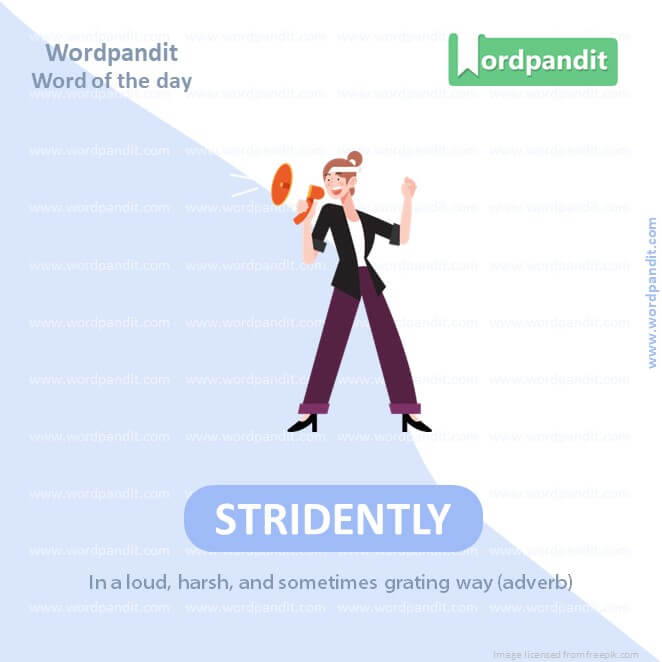
WORD 4: STRIDENTLY
CONTEXT: The awakened and alert electorate took on the challenge and sent an unambiguous message to the world that the voter in India stands tall in stridently conveying her indignation at the rise of creeping insidious authoritarianism and sullied politics.
SOURCE: The Hindu
EXPLANATORY PARAGRAPH: Think about someone talking very loudly and clearly, so much that it almost feels a bit too much. That’s being “strident.” It means saying something in a very loud and forceful way.
MEANING: In a loud, harsh, and sometimes grating way (adverb).
PRONUNCIATION: STRY-dent-lee
SYNONYMS: Loudly, harshly, raucously, vociferously, shrilly
USAGE EXAMPLES:
1. She spoke stridently during the debate to make her point heard.
2. The alarm rang stridently, waking everyone up.
3. He argued stridently against the proposed changes.
4. The birds outside chirped stridently early in the morning.
WORD 5: AVALANCHE
CONTEXT: The outcome has redeemed the very forte of democracy by rightfully checking the overwhelming avalanche of smothering oppression combined with unbridled communalism that had brought the Muslim community under a cloud of fear and insecurity.
SOURCE: The Hindu
EXPLANATORY PARAGRAPH: Imagine a huge amount of snow sliding down a mountain all at once because too much snow piled up. That’s an “avalanche.” It’s a mass of snow, ice, and rocks falling rapidly down a mountainside.
MEANING: A mass of snow, ice, and rocks falling rapidly down a mountainside (noun).
PRONUNCIATION: AV-uh-lanch
SYNONYMS: Landslide, snowslide, rockslide, cascade, torrent
USAGE EXAMPLES:
1. The avalanche buried the ski resort in snow.
2. They triggered an avalanche while climbing the mountain.
3. The risk of avalanche is high after heavy snowfall.
4. An avalanche warning was issued for the area.
WORD 6: OPTIMISTICALLY
CONTEXT: Though one wavers between moods of hope and despair, one could optimistically look towards a robust Opposition with the government in power ready to listen and debate.
SOURCE: The Hindu
EXPLANATORY PARAGRAPH: Imagine you are hoping that the rain will stop so you can go play outside. Thinking like this, believing that good things will happen, is being “optimistic.” “Optimistically” means doing something with hope and a positive outlook.
MEANING: In a way that shows hope and confidence about the future (adverb).
PRONUNCIATION: op-tuh-MIS-tik-lee
SYNONYMS: Hopefully, positively, with hope, expectantly, with optimism
USAGE EXAMPLES:
1. He optimistically planned the outdoor event.
2. They viewed the future of the company optimistically.
3. She spoke optimistically about her recovery.
4. They approached the negotiations optimistically.
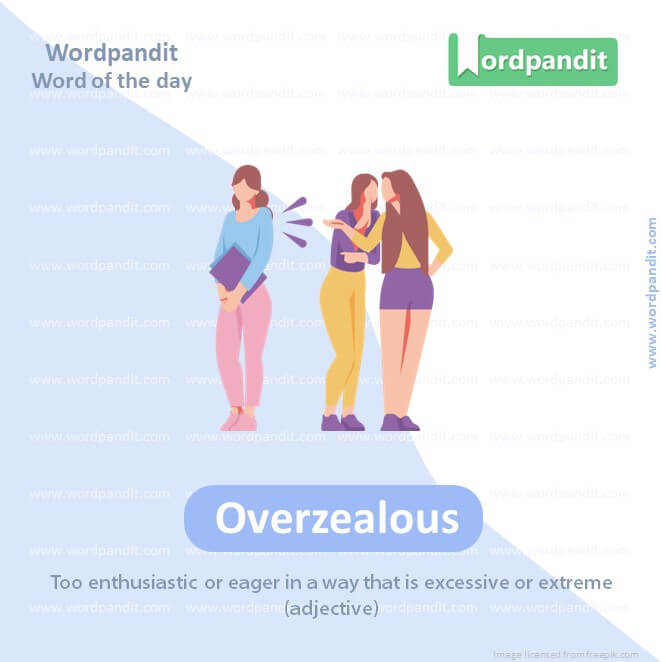
WORD 7: OVERZEALOUS
CONTEXT: It is in such a political milieu that a conversation has to begin between the overzealous conservatives and the beleaguered left.
SOURCE: The Hindu
EXPLANATORY PARAGRAPH: Imagine being so excited about cleaning up your room that you end up cleaning the whole house and rearranging everything, even things that were okay. That’s being “overzealous.” It means being too enthusiastic and going beyond what’s reasonable or necessary.
MEANING: Too enthusiastic or eager in a way that is excessive or extreme (adjective)
PRONUNCIATION: oh-ver-ZEL-us
SYNONYMS: Excessive, overly eager, fanatical, obsessive
USAGE EXAMPLES:
1. His overzealous behavior at the meeting was off-putting.
2. The overzealous security measures were criticized.
3. She was overzealous in her pursuit of perfection.
4. The coach’s overzealous training regimen led to injuries.
WORD 8: RIVETING
CONTEXT: The heated debates on the floor of the Houses were riveting and have ignited the proper working of Parliament.
SOURCE: The Hindu
EXPLANATORY PARAGRAPH: Imagine watching a movie that is so interesting and exciting that you can’t look away, not even for a second. That’s what “riveting” means. It describes something that captures your complete attention because it’s so interesting.
MEANING: Completely engrossing; compelling (adjective).
PRONUNCIATION: RIV-it-ing
SYNONYMS: Fascinating, captivating, engrossing, absorbing, compelling
USAGE EXAMPLES:
1. The documentary was so riveting that I watched it twice.
2. She gave a riveting performance that captivated the audience.
3. The book was riveting, I couldn’t put it down.
4. His story was riveting, keeping everyone on the edge of their seats.
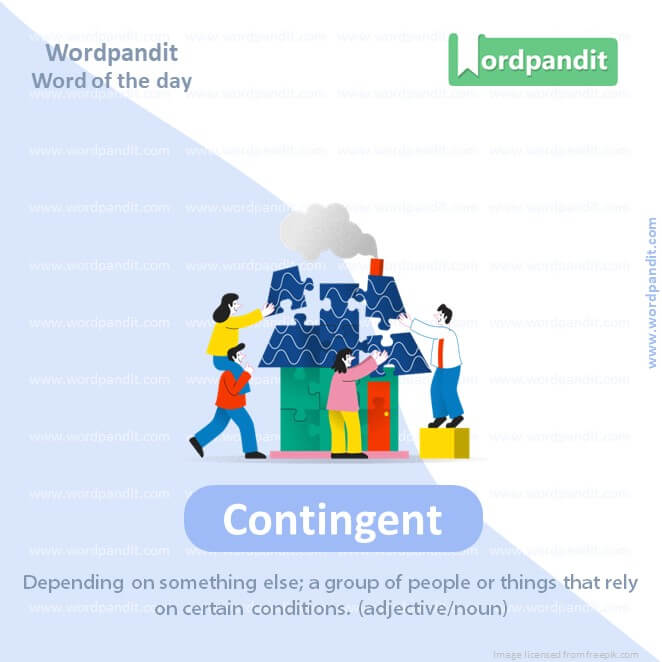
WORD 9: CONTINGENT
CONTEXT: The landmark Shreya Singhal judgment addressed this by upholding Section 79 of the IT Act which grants intermediaries ‘safe harbour’ protection against hosting content, contingent upon meeting the due diligence requirements outlined in Section 3(1)(b) of the Information Technology (Intermediaries Guidelines) Rules. However, its application to Generative AI tools remains challenging.
SOURCE: The Hindu
EXPLANATORY PARAGRAPH: Imagine you are planning to go to the park, but only if it doesn’t rain. That “if it doesn’t rain” part makes your plan “contingent.” It means depending on something else that has to happen first.
MEANING: Depending on something else; a group of people or things that rely
on certain conditions. (adjective/noun)
PRONUNCIATION: kun-TIN-jent
SYNONYMS: Dependent, conditional, subject to, reliant on, based on
USAGE EXAMPLES:
1. Our trip is contingent on the weather.
2. The deal was contingent upon financing approval.
3. Attendance numbers are contingent on venue capacity.
4. The plans are contingent on the committee’s approval.
WORD 10: ENACTMENT
CONTEXT: The landmark K.S. Puttaswamy judgment (2017) by the Supreme Court of India established a strong foundation for privacy jurisprudence in the country, leading to the enactment of the Digital Personal Data Protection Act, 2023 (DPDP).
SOURCE: The Hindu
EXPLANATORY PARAGRAPH: Imagine you and your friends decide to make up rules for a game. When you all agree and start using those rules, you are putting them into action, or “enacting” them. “Enactment” refers to the act of making something into a law or rule and putting it into effect.
MEANING: The process of passing legislation or the act of putting something into practice (noun).
PRONUNCIATION: ee-NAKT-ment
SYNONYMS: Passing, ratification, implementation, execution, establishment
USAGE EXAMPLES:
1. The enactment of the new law will take place next month.
2. He was involved in the enactment of several key policies.
3. The historical reenactment shows the enactment of ancient rituals.
4. The enactment of these regulations has improved safety standards.
Vocabulary Words in English
In the kaleidoscopic world of language, the thread of ‘vocabulary words in English’ weaves a rich tapestry. These words, the building blocks of communication, lend themselves to the eloquence and effectiveness of our speech and writing. Despite their significance, mastering ‘vocabulary words in English’ can sometimes be daunting, but with strategic approach, the process can be greatly simplified.
Learning ‘vocabulary words in English’ goes far beyond rote memorization. It requires an integrated approach that encompasses understanding and using the words. Consuming a diverse range of English materials such as novels, news articles, movies, music, and online content can acquaint you with words in actual use, helping you perceive both their meaning and usage in different contexts.
Furthermore, incorporating memory-enhancing techniques can add impactful strides to your journey of mastering ‘vocabulary words in English’. Methods such as the Leitner System or flashcards can bolster the memory retention of these words. Meanwhile, using mnemonic devices, associating words with unique stories or images, can help in retaining the ‘vocabulary words in English’ in long-term memory.
Another key to deciphering ‘vocabulary words in English’ is by practicing them in real-world contexts. Incorporate the new words into your daily conversations, written emails, or social media posts. Not only will this reinforce the meanings and applications, but also boost your confidence in using them.
In essence, understanding ‘vocabulary words in English’ is a continual journey that calls for persistent commitment, diverse learning approach, and ample practice. As you indulge in this exploration, you will find your command over the ‘vocabulary words in English’ becoming stronger, leading to more confident and dynamic communication. Remember – in the world of language, words are your faithful companions, and the more you engage with them, the more they’ll reveal their richness to you.







